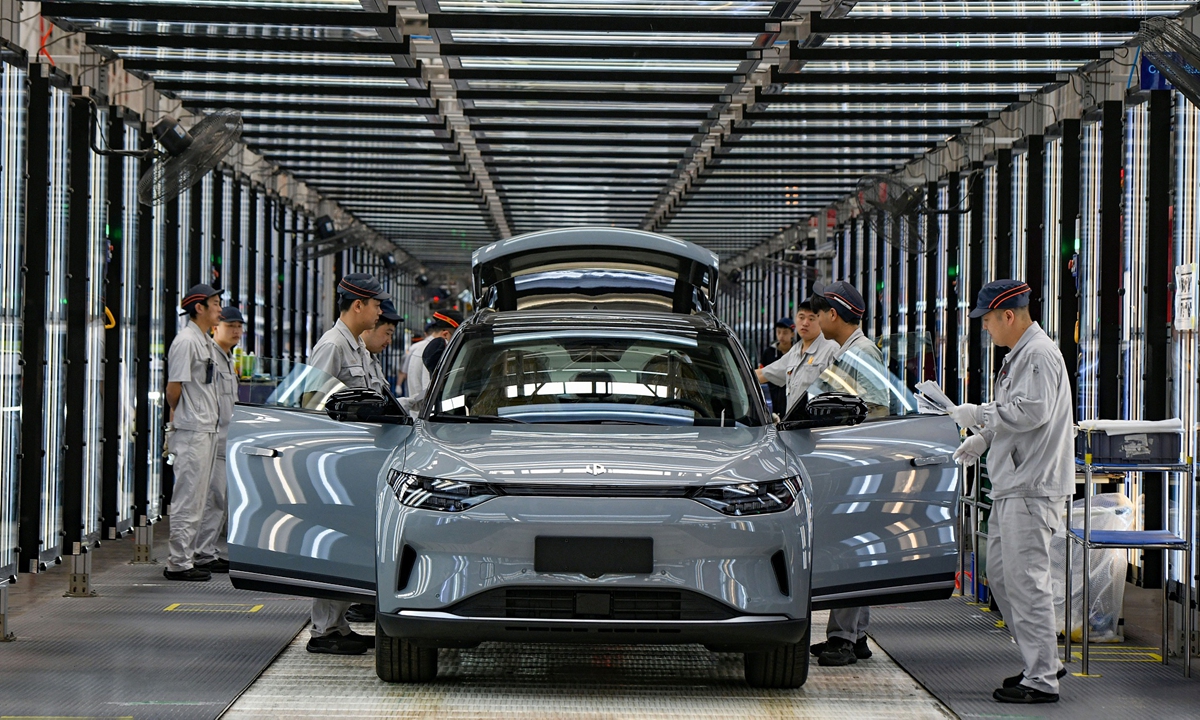Workers complete assembling an electric vehicle (EV) at China’s EV start-up Leapmotor in Jinhua, East China’s Zhejiang Province on April 1, 2024. The smart EV factory delivered 14,567 new vehicles in March, a yearly increase of 136 percent. Photo: VCG
After the EU announced extra duties on imported Chinese electric vehicles (EVs), Olof Gill, European Commission Spokesperson for Trade told media that China was free to initiate dispute settlement proceedings against the EU through the World Trade Organization (WTO), but there was “no need to take any retaliatory measures.” Such logic is absurd.
The EU wields the tariff stick against China, but requests China not to strike back. It is as absurd as driving a vehicle in the reverse direction but unreasonably asking surrounding vehicles driving in the normal forward direction not to collide with itself.
First of all, it should be noted which party is pushing China and the EU toward a dangerous trade row.” Obviously, the answer is the EU.
A few years ago, although the official public stance of the EU and EU members has always been to oppose “decoupling,” protectionism, and supporting globalization and multilateralism, some people within Europe have generalized the concept of economic security and stepped up its “de-risking” rhetoric against China. Especially as Washington is pushing toward this direction from the outside, some EU officials see China as an “economic competitor” and a “systemic rival.”
There is competition between China and the EU, but cooperation far outweighs competition. Chinese officials have repeatedly expressed their hope that the EU side can view bilateral relations in a rational light, and work with China to maintain a sound relationship that focuses on dialogue and cooperation and features mutual benefit and win-win results. However, it seems the EU side isn’t interest in listening to China.
What’s worse, a rise of irrational sentiment, with which some European politicians see China as a competitor or rival, has been reflected in EU’s trade policy. Since October 2023, the EU has implemented a total of 41 trade and investment restrictions targeting China, including 35 trade remedy investigations and measures against Chinese products, with the total amount involved reaching $28.4 billion. EVs are a typical example. The recent “overcapacity” hype pushed by some EU officials, an anti-subsidy investigation into the imports of EVs from China, and the announcement of extra duties are all malicious acts to unfairly undercut competitors.
China has always taken a rational and pragmatic attitude toward this issue, and viewed bilateral relations from a long-term and strategic perspective. There’s a lot of work that has to be done by the Chinese side to strengthen communication. Nowadays, even ordinary people know that Chinese automakers have a cost advantage due to continuous innovation, lower labor costs, and a complete industrial chain. It is absurd to attribute China’s comprehensive economic advantage to so-called government subsidies. It’s impossible that EU politicians and economists don’t understand this.
To put it bluntly, the EU’s decision to impose extra duties on imported Chinese EVs has indeed triggered widespread anger among Chinese industries. If the EU eventually places additional tariffs of up to 38.1 percent on EVs imported from China, Chinese industries will surely call on the Chinese government to take strong countermeasures to protect their interests. We do not wish to speculate, but we can be sure that the Chinese government will take all necessary measures to protect the legal rights and interests of Chinese industries. If it may cause escalation of trade conflicts, the EU is to be blamed.
China is doing what it should. China is responsible and principled and a major trade power with its own strengths. If the EU was to break the basic trade rules first, then China should fight back.
The US has announced a 100 percent tariff on Chinese-made EVs as part of a package of measures designed to suppress China’s new-energy industries. The additional tariffs in the EU are lower than those in the US. So, in some European officials’ minds, China should swallow its anger, or at least make a compromise with the EU on trade. They have got it wrong. Washington’s trade policy is full of bravado, given that few Chinese EVs are actually sold in the US. The EU’s purpose is not to intimidate, but to combat actual Chinese exports. Therefore, China has reason to respond to this.
We have noted that the EU’s decision to increase customs duties on Chinese EVs has encountered opposition, especially from the European business community. The agitators are mainly political forces. It shows those politicians’ perception of “economic security” is skewed away from the reality of EU trade with China. In the present era of globalization, protectionism is a dead end. It is our sincere hope that the European Commission won’t lead the European economy into a dead end of protectionism, and won’t bring China-EU economic relations on the brink of spiraling into a dangerous trade row.

